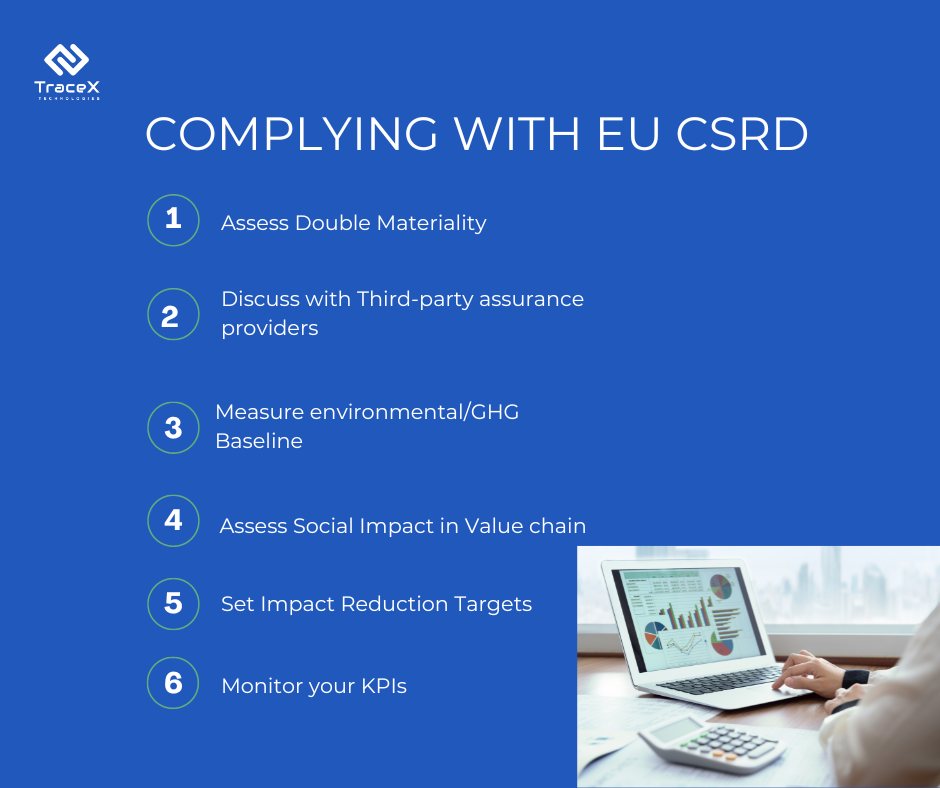Contact: +91 99725 24322 |
Menu
Menu
Quick summary: Dive into the Game-Changing Landscape of CSRD with Our Comprehensive Guide! Uncover the nuances, requirements, and transformative impact of the Corporate Sustainability Reporting Directive (CSRD). Stay ahead in sustainability reporting, navigate complexities, and seize opportunities for a greener future.

Prepare for a Business Transformation! The CSRD goes beyond reporting obligations; it aims to reshape the business sector into a more sustainable and resilient economy. This framework assists companies in managing risks, attracting capital, aligning climate strategies with global net-zero goals, and developing robust products and services for dynamic markets.
Corporate Sustainability Reporting Directive (CSRD) is not just a regulatory milestone; it’s a strategic enabler for businesses seeking to bolster their sustainability efforts. The European Commission’s commitment to standardizing sustainability disclosures underscores the growing importance of transparent and comprehensive reporting.
European reporting standards set by ESRS are considered the gold standard in sustainability practice, offering guidance on actions, methodologies, information collection, goal tracking, and essential KPIs. This guide will unlock CSRD and encompasses its profound significance, core objectives, reporting intricacies, and the far-reaching implications for businesses operating in an interconnected global context.
To comprehend the significance of CSRD, it is essential to trace the historical evolution of sustainability reporting frameworks. The journey began with the emergence of initiatives like the Global Reporting Initiative (GRI) and the Task Force on Climate-related Financial Disclosures (TCFD). These frameworks sought to encourage organizations to voluntarily disclose their environmental and social impacts, fostering transparency and accountability. While these initiatives marked significant strides, they also revealed the need for a more standardized and comprehensive approach to sustainability reporting.
The genesis of CSRD can be traced to the European Commission’s commitment to advancing sustainability practices and addressing the limitations of existing reporting frameworks. Announced in April 2021 as part of the European Green Deal, CSRD aims to fill the gaps in current reporting practices by introducing mandatory sustainability disclosures for a broader set of entities. The overarching objectives include enhancing transparency, comparability, and the reliability of sustainability information. CSRD is not merely a compliance requirement; it is a strategic initiative to reshape corporate reporting, aligning it with the evolving expectations of stakeholders and investors.
CSRD marks a paradigm shift in the corporate landscape by placing sustainability at the forefront of reporting obligations. The directive recognizes that sustainability is no longer a peripheral concern but an integral aspect of business operations. By expanding the scope of reporting to include a wider range of entities, CSRD acknowledges that businesses, irrespective of their size or sector, play a crucial role in contributing to sustainable development. This shift in perspective is not just regulatory; it reflects a broader societal expectation for businesses to be accountable for their environmental and social impacts.
CSRD introduces a comprehensive set of reporting requirements that go beyond the traditional financial disclosures. The directive mandates businesses to report on a range of sustainability factors, including environmental, social, and governance aspects. This holistic approach ensures that the disclosed information provides a complete picture of a company’s impact on society and the environment. The integration of financial and non-financial information is a key feature, aligning with the growing recognition that sustainability performance is intertwined with financial performance.
The reporting requirements under CSRD cover a spectrum of areas, including the organization’s impact on climate change, resource use, biodiversity, and human rights. Businesses are required to disclose information on their governance structures, policies, and due diligence processes related to sustainability matters. This multifaceted approach reflects the understanding that sustainable business practices encompass not only environmental considerations but also social and ethical dimensions.
The landscape of ESG reporting is swiftly evolving, propelled by significant proposals in the European Union, the United States, and on a global scale through the International Sustainability Standards Board. Of particular immediacy is the EU’s Corporate Sustainability Reporting Directive (CSRD), enacted in January 2023. This directive, designed to instigate transformative shifts in the business conduct of EU-operating companies, poses a potential impact on global businesses, including US companies with qualifying EU subsidiaries.
About 50000 companies need to comply with CSRD’s reporting requirements
CSRD’s implications for businesses are profound and extend beyond mere compliance. The directive compels organizations to adopt a more strategic and integrated approach to sustainability. As businesses navigate the complexities of compliance, they are prompted to reassess their existing reporting practices and integrate sustainability considerations into their core business strategies. CSRD essentially acts as a catalyst for a cultural shift within organizations, fostering a mindset where sustainability is not a checkbox but an intrinsic part of decision-making processes.
The CSRD regulations primarily target companies with a significant presence in the European market. These encompass:
Listed Companies: Publicly listed companies on the stock exchange, excluding micro-undertakings, are obligated to adhere to these regulations.
Listed SMEs: Small and medium-sized enterprises that are publicly listed fall within the scope of these regulations.
Non-EU Firms: Non-EU companies with a net turnover of €150 million and at least one substantial subsidiary or branch in the EU are subject to compliance.
Subsidiaries of Global Non-EU Firms: Subsidiaries of global non-EU firms are exempt from reporting only when their non-financial information is integrated into the parent company’s consolidated management report.
Large Enterprises: Large enterprises meeting specific criteria are also encompassed by these regulations.
Though interconnected, the CSRD and ESRS fulfill distinct roles. The CSRD establishes the legal framework and reporting obligations, while the ESRS acts as the guiding roadmap for compliance. Companies falling under the CSRD ambit must strategically navigate these distinctions to ensure precise and punctual reporting.

While CSRD represents a significant step forward, it is not without its challenges. Businesses face various hurdles in aligning their operations with the rigorous requirements of the directive.
Navigating these challenges demands a proactive and strategic approach to CSRD compliance, involving comprehensive planning, robust data management systems, and ongoing efforts to stay abreast of regulatory updates.
The impact of CSRD extends beyond European borders, influencing the global discourse on sustainability reporting. As businesses increasingly operate on an international scale, the directive’s implications resonate far beyond the European Union.
By embracing technological solutions, companies can not only streamline their CSRD compliance processes but also enhance overall sustainability efforts, promote transparency, and meet the evolving expectations of stakeholders and regulatory authorities.
TraceX sustainability and traceability solutions play a crucial role in optimizing data management for businesses working towards sustainability goals. The solution facilitates the capture of comprehensive sustainability data, including information related to supply chain processes, environmental impact, and social responsibility. With real-time monitoring capabilities, TraceX enables businesses to track and manage sustainability data as it evolves, ensuring the information is current and accurate. The solution offers traceability features that allow businesses to track the entire supply chain, from raw materials to the end product. This traceability enhances the accuracy of sustainability data by providing insights into each stage of the process. Automation features in TraceX streamline data collection processes, reducing manual efforts and minimizing the risk of errors. This efficiency is crucial for managing large volumes of sustainability-related data. TraceX enhances visibility into the supply chain, enabling businesses to monitor and manage sustainability practices across suppliers, manufacturers, and distributors.
TraceX utilizes blockchain technology to enhance data security and integrity. This ensures that sustainability data is tamper-resistant, providing a reliable and transparent record. TraceX can seamlessly integrate with existing data management systems, ensuring a smooth transition and enabling businesses to leverage their current infrastructure. The solution provides customizable reporting tools, allowing businesses to generate reports tailored to their specific sustainability metrics and compliance requirements.
The Corporate Sustainability Reporting Directive represents a transformative milestone in the journey towards transparent and responsible business practices. As businesses navigate the complexities of compliance, CSRD compels a reevaluation of reporting practices, integrating financial and non-financial disclosures to provide stakeholders with a holistic view of sustainability performance. The challenges posed by CSRD are opportunities for businesses to strengthen their commitment to sustainability, embracing a strategic and integrated approach that goes beyond regulatory compliance.
The global implications of CSRD underscore the need for harmonized reporting practices, especially for multinational corporations operating across diverse markets. Looking ahead, CSRD’s anticipated evolution and integration with emerging sustainability trends position it as a dynamic framework at the forefront of global sustainability reporting initiatives. As organizations embrace the principles of CSRD, they not only meet regulatory obligations but also contribute to a future where sustainable and responsible business practices are integral to success. CSRD is more than a directive; it is a catalyst for positive change, shaping the future of corporate reporting and fostering a world where businesses thrive in harmony with the environment and society.
